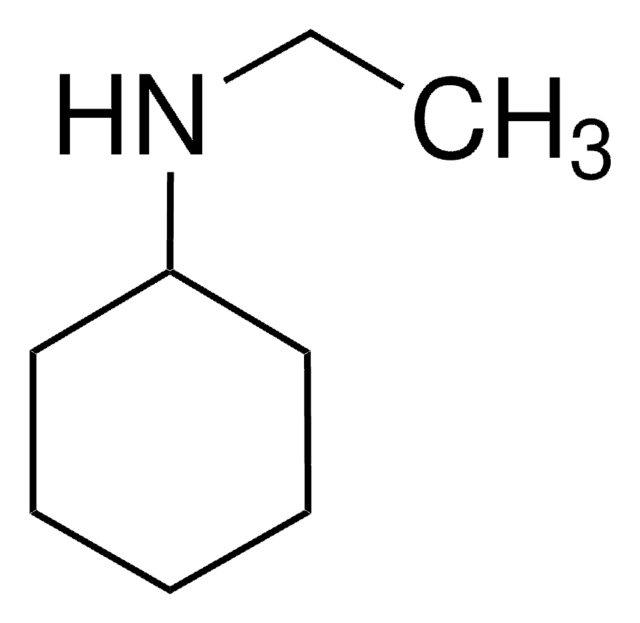245623
1-Chlorohexadecane
95%
Synonym(s):
Cetyl chloride, Hexadecyl chloride
Sign Into View Organizational & Contract Pricing
All Photos(1)
About This Item
Linear Formula:
CH3(CH2)15Cl
CAS Number:
Molecular Weight:
260.89
Beilstein:
1748498
EC Number:
MDL number:
UNSPSC Code:
12352100
PubChem Substance ID:
NACRES:
NA.22
Recommended Products
vapor pressure
129 mmHg ( 21 °C)
Quality Level
Assay
95%
form
liquid
refractive index
n20/D 1.449 (lit.)
bp
149 °C/1 mmHg (lit.)
mp
8-14 °C (lit.)
density
0.865 g/mL at 25 °C (lit.)
SMILES string
CCCCCCCCCCCCCCCCCl
InChI
1S/C16H33Cl/c1-2-3-4-5-6-7-8-9-10-11-12-13-14-15-16-17/h2-16H2,1H3
InChI key
CLWAXFZCVYJLLM-UHFFFAOYSA-N
Looking for similar products? Visit Product Comparison Guide
Related Categories
General description
The electron impact mass spectra of 1-chlorohexadecane was studied by sampling with supersonic molecular beams.
Storage Class Code
10 - Combustible liquids
WGK
WGK 3
Flash Point(F)
276.8 °F - closed cup
Flash Point(C)
136 °C - closed cup
Personal Protective Equipment
dust mask type N95 (US), Eyeshields, Gloves
Choose from one of the most recent versions:
Already Own This Product?
Find documentation for the products that you have recently purchased in the Document Library.
Customers Also Viewed
S Dagan et al.
Journal of the American Society for Mass Spectrometry, 6(2), 120-131 (1995-02-01)
The electron impact mass spectrometry of straight chain alkanes C8H18-C40H82, squalane, methylstearate, 1-chlorohexadecane, 1-bromohexadecane, and dioctylphthalate was studied by sampling them with supersonic molecular beams. A fly-through Brink-type electron impact ion source was used, utilizing a vacuum background ion filtration
K Koike et al.
Applied and environmental microbiology, 65(12), 5636-5638 (1999-12-03)
A mutant Rhodococcus strain lacking the ability to utilize 1-chlorohexadecane was found to cis-desaturate aliphatic compounds, such as 1-chlorohexadecane, n-hexadecane, and heptadecanonitrile, yielding corresponding products with a double bond mainly at the ninth carbon from the terminal methyl groups. A
G L Murphy et al.
Applied and environmental microbiology, 53(1), 10-13 (1987-01-01)
The composition of phospholipids from Mycobacterium convolutum R22 was determined after growth at two temperatures (20 and 30 degrees C) with 1-chlorohexadecane as the substrate. Comparisons were made with the phospholipids of cells grown on n-hexadecane. Phosphatidylinositolmannosides and phosphatidylethanolamine (PE)
H Curragh et al.
Microbiology (Reading, England), 140 ( Pt 6), 1433-1442 (1994-06-01)
The bacterium Rhodococcus rhodochrous NCIMB 13064, isolated from an industrial site, could use a wide range of 1-haloalkanes as sole carbon source but apparently utilized several different mechanisms simultaneously for assimilation of substrate. Catabolism of 1-chlorobutane occurred mainly by attack
Nicolas Goujon et al.
Physical chemistry chemical physics : PCCP, 17(35), 23059-23068 (2015-08-15)
The development of new polymerizable lyotropic liquid crystals (LLCs) utilizing charged amphiphilic molecules such as those based on long chain imidazolium compounds, is a relatively new design direction for producing robust membranes with controllable nano-structures. Here we have developed a
Our team of scientists has experience in all areas of research including Life Science, Material Science, Chemical Synthesis, Chromatography, Analytical and many others.
Contact Technical Service












